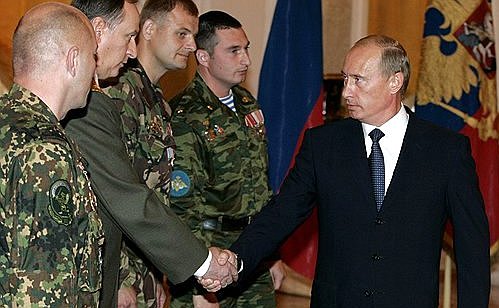
On Russian foreign and military affairs, I have a lot of time for British academic Mark Galeotti. I recommend his work to anyone interested in these topics. An expert on Russian history and government, he is currently a Senior Research Fellow at the Institute of International Affairs Prague, and Principal Director of the consultancy Mayak Intelligence.
In a piece at War on the Rocks, Galeotti acknowledges the traditionally cited sources for Russia’s so-called “hybrid war” approach: its relative post-Soviet economic weakness and a military/political inheritance from the Soviet and Tsarist eras. However, he argues that the Putin government’s approach to foreign and military policy is a reflection of the hybrid nature of the current Russian state:
Today, Russia is a patrimonial, hyper-presidential regime, one characterized by the permeability of boundaries between public and private, domestic and external. As oligarch-turned-dissident Mikhail Khodorkovsky put it:
[W]hat distinguishes the current Russian government from the erstwhile Soviet leaders familiar to the West is its rejection of ideological constraints and the complete elimination of institutions.
Lacking meaningful rule of law or checks and balances, without drawing too heavy-handed a comparison with fascism, Putin’s Russia seems to embody, in its own chaotic and informal way, Mussolini’s dictum “tutto nello Stato, niente al di fuori dello Stato, nulla contro lo Stato” — “everything inside the State, nothing outside the State, nothing against the State.” Parenthetically, Mussolini sent what could be called “little blackshirt men” to Spain in the 1930s to fight on Franco’s side during the civil war. All notionally opted to do so of their own volition (as the Voluntary Troops Corps) and initially without insignia.
In Russia, state institutions are often regarded as personal fiefdoms and piggy banks, officials and even officers freely engage in commercial activity, and the Russian Orthodox Church is practically an arm of the Kremlin. Given all that, the infusion of non-military instruments into military affairs was almost inevitable. Beyond that, though, Putin’s Russia has been characterized — in the past, at least — by multiple, overlapping agencies, a “bureaucratic pluralism” intended as much to permit the Kremlin to divide and rule as for any practical advantages.
Galeotti asserts that the Putin regime believes itself in a “geopolitical, even civilizational struggle” with the West, and its approach to the conflict mirrors the way the regime operates, with “blurring of the borders between state, paramilitary, mercenary, and dupe.”
He lays out his argument fully in a newly published study, Hybrid War or Gibridnaya Voina? Getting Russia’s non-linear military challenge right.

It surprises me to see that the US indeed possesses analysts of such quality, but their foreign policies and decisions still being irrational and rather naive (especially when observing Kerry).
Galeotti is not an American analyst, alas. I suspect the U.S. government has many analysts of the same quality. Whether or not the decision-makers listen to them is another question. I suspect that we are all about to find out whether or not expert advice is necessary for successful presidential decision-making.
I think the answer is relative simple, especially if we take a look at the current competence team. An irrational choice, 3 Star General Flynn who regularly presented his face on RT.